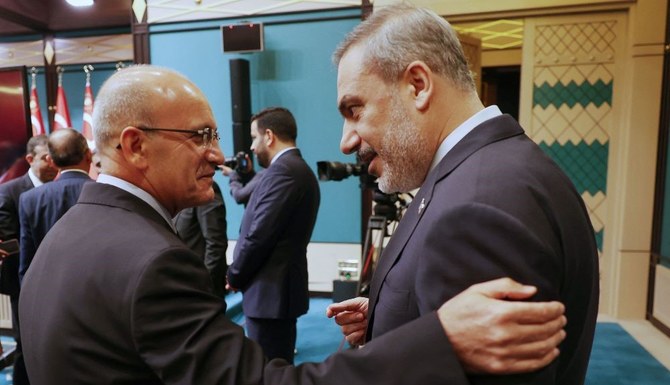
- ARAB NEWS
- 15 Jul 2025

ANKARA: Turkiye’s central bank raised its key interest rate by an aggressive 7.5 percentage points on Thursday, a larger-than-expected hike that further signaled a return to more traditional economic policies under President Recep Tayyip Erdogan.
The bank increased its policy rate to 25 percent as it continued to backtrack from the previous rate-cutting course set by Erdogan, which is blamed for fueling a cost-of-living crisis that left many households struggling to afford rent and basic goods as inflation surged.
“Monetary tightening will be further strengthened as much as needed in a timely and gradual manner until a significant improvement in the inflation outlook is achieved,” the central bank said.
Selva Demiralp, a professor of economics at Koc University in Istanbul, said that normally, interest rate increases slow the economy and can even cause a recession.
“Yet in Turkiye we are discussing whether the larger-than-anticipated rate hike could control a downturn,” she told Arab News.
“This is a properly designed question. That is because the low interest rate environment pretty much froze credit growth.”
The upper limit on commercial loans was also increased, by more than 56 percent. Demiralp said that by allowing banks to set deposit and loan rates more competitively, credit flow could resume, albeit at higher interest rates.
But she and some other experts warned that the interest rate increase alone is unlikely to be sufficient or durable enough to resolve the problems, and so additional determined moves are needed to help curb rebounding inflation and correct long-running economic woes.
“I see it as a first signal that the new members of the PPK (Monetary Policy Committee) of the central bank were able to implement a more hawkish stance and convince the president that this is better for the economy,” said Demiralp.
“Our year-end inflation forecast is close to 70 percent. In that environment, a 25 percent policy rate still implies a very negative real interest rate and won’t be sufficient. What is critical is the continuation of the hawkish tone that we have witnessed today.”
Nick Stadtmiller, head of product at research company Medley Advisors in New York, agreed that the rate increase is a step in the right direction but he does not believe it will be sufficient to reduce inflation.
“I think rates would need to rise at least to 40 percent in order to have a big impact on price growth,” he told Arab News. “Rates that are sufficiently high to reduce inflation will slow economic growth and reduce credit demand.
It is difficult to see how policymakers can cut inflation while at the same time stimulating growth in corporate demand, which is their stated goal, he added.
“The other problem is that the gradual approach to tightening policy ultimately means they will have to raise rates later by even more in order to cut inflation down,” Stadtmiller said.
“Many other central bankers around the world have said in recent years that increasing rates quickly will allow them to raise rates by less over the entire cycle. The opposite is also true: Raising rates slowly means you have to reach a higher terminal rate at the end to have a similar impact.”
It would not be a surprise if the central bank now pauses and takes a few months to assess the effects of the rate hike before taking further action, he added.
“With corporate-loan growth near zero, policymakers may want to see the impact on the economy before tightening more,” Stadtmiller said.
Turkiye’s struggling currency, the lira, surged on Thursday in response to the interest rate increase. It gained as much as six percent against the dollar after Erdogan followed up the announcement by expressing strong confidence in his finance team.
“We are taking determined steps to address the problems caused by inflation,” the president said in nationally televised remarks.
In a message posted on social media, Finance Minister Mehmet Simsek wrote: “We are determined. Price stability is our top priority.”